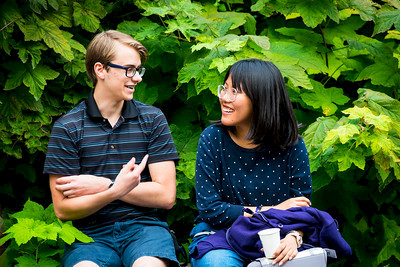Listen Actively
Becoming a better listener is key to fostering meaningful connections!
Active listening helps you fully engage in conversations, whether in the classroom, with friends, or in civic discussions. By focusing on the speaker, asking thoughtful questions, and reflecting on what’s being said, you not only enhance your understanding but also show respect and empathy.
Explore Active Listening Best Practices
Enhance your relationships as a more effective communicator!
The Husky Experience Toolkit offers valuable resources to help you develop active listening skills. Whether you're in a classroom, at work, or engaging in civic discussions, learning to listen actively is key to understanding others and fostering deeper connections.
The tools and guides available here provide practical tips on how to focus, ask thoughtful questions, and engage meaningfully in conversations.
BINGO TIP: The skills you build in this tile directly enhance your ability to engage in meaningful dialogue about differences. Explore the Dialogue About Issues Respectfully tile for additional activities to strengthen your skills in civic conversations and improve your ability to communicate across diverse perspectives.
Mastering Active Listening in STEM
Master the art of listening like professionals in various fields do!
This orientation allows us to fully understand the perspectives, needs, and concerns of others, which ultimately enhances problem-solving and collaboration. Active listening, which involves paraphrasing and asking thoughtful, value-based questions, deep listening that offers space for uninterrupted expression, and embodied listening, where we tune into our physical reactions, are all valuable techniques.
Read A Key Ingredient for SciComm: Listening from the College of the Enviroment
Radical Listening: Amplifying Voices by Listening Without Judgment
Rooted in the idea of quieting one's own thoughts and allowing marginalized voices to speak freely!
Radical listening, as described by UW Professor Ralina Joseph and UW's Center for Communication, Difference, and Equity (CCDE), is a method of listening without judgment, focusing entirely on the speaker without trying to respond or solve the issue. In her community-based project in Seattle's Central District, Joseph and her team are engaging participants, particularly Black and brown voices, to share their stories about race and injustice.
Read Radical Listening in the UW Magazine
Center for Communication, Difference, and Equity - UW Research
Active Listening in Practice
Explore these tools to start becoming a better listener today!
Active Listening is a powerful practice that fosters understanding and empathy in conversations by giving full attention to the speaker without interruptions or judgments. Berkeley's Greater Good Science Center (GGSC) and their Greater Good in America initiative offers practical exercises and techniques to improve your listening skills, helping you engage more meaningfully with others.
They offer science-based practices for a meaningful life that you can practice with a friend or family member. By mastering active listening, you'll build stronger relationships, resolve conflicts more effectively, and create a more supportive environment in both personal and professional settings.
Active Listening Guide from Berkely's Greater Good In America Intiative



